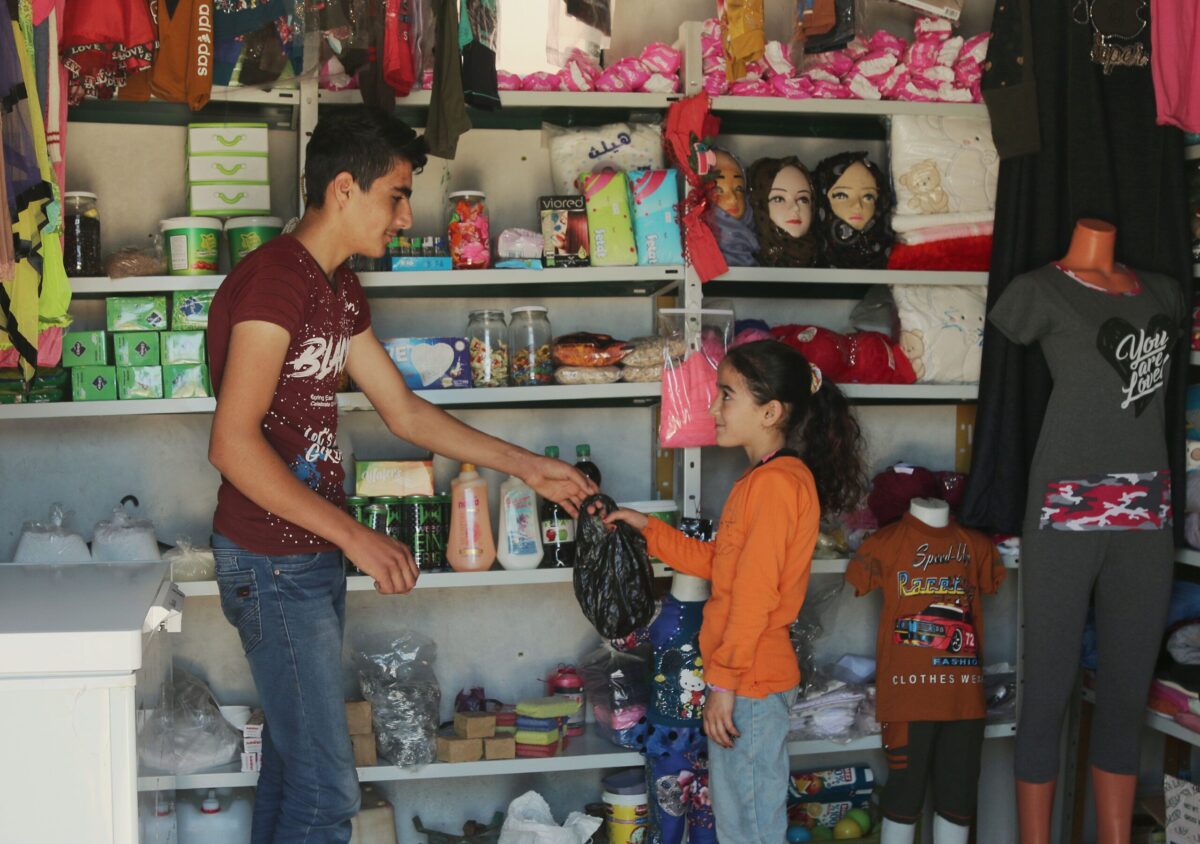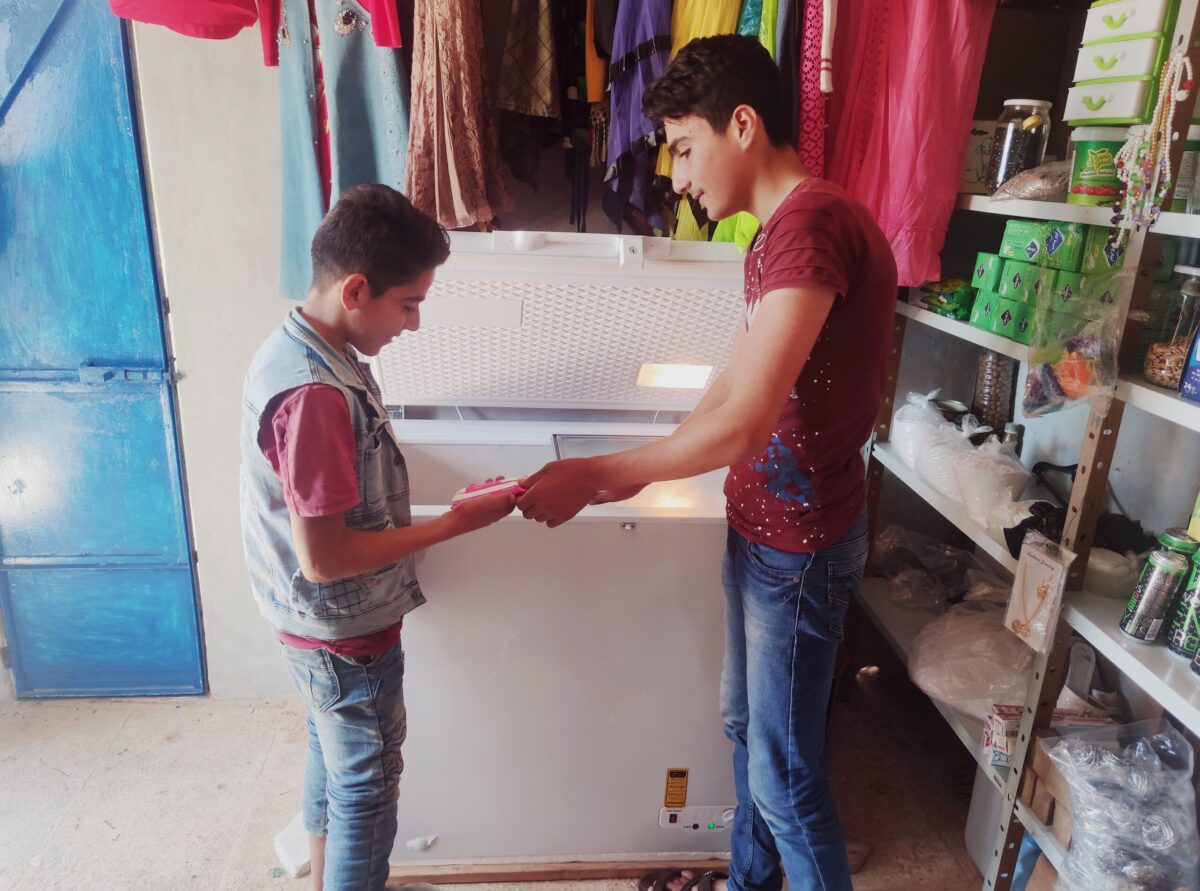 Stories
Stories
January 10, 2023 • 4 min read
"I have great ambitions for this place,” says 43-year-old mother of five, Um Khaled*. She is confident that the business she has taken great pains to build will continue to grow.
“I am trying hard to expand my shop and to ensure it stays open, stocking various types of goods. It may not be comparable to larger stores, but for me it is a shopping mall, and hopefully it will really be so one day.”
Um Khaled’s shop in Qalb Lozeh, a village in Idleb in Northwest Syria, is one of the hundreds of Small and Medium Enterprises (SMEs) GOAL has supported with cash grants and technical business training in 2022. Thanks to GOAL’s support, Um Khaled has been able to strengthen her neighborhood store and ensure that it can serve her community sustainably.
Mounting Challenges
While Um Khaled is enjoying success with the business today, things weren’t always this way.
Before the outbreak of conflict, Um Khaled’s husband worked in construction in Lebanon while Um Khaled raised the young couple’s children.
“After conflict erupted across the country, we tried as much as possible to live under the realities imposed by the war,” Um Khaled says, remembering the circumstances that led her to open the business.
“Misfortunes never arrive alone, but in battalions,” she adds with a sigh. “In 2013, my husband went out and has not returned to this day. I was unable to find out anything about his fate, whether he is alive or not. I felt there was no hope in my life, and helplessness began to take hold of me.”
Um Khaled began to look for casual work in agricultural harvesting to make ends-meet for her children. Emerging health issues experienced by her youngest son, then three-year-old Abdullah, meant she could neither find enough time to work in the fields nor earn enough money to cover medical expenses.
“I spent many nights crying, wishing not to wake up the next morning so that my suffering could end,” she says. “When I saw my children in the morning, I’d withdraw this grave wish, as I’d think – who will take care of them, who will feed them, if I’m gone?”
A Will to Go On
With the family’s expenses rising, Um Khaled decided to sell clothes to her neighbours to earn more money. As demand slowly grew, she decided to rent a shop at the village center. She later added food to the range of items on offer. But no matter how hard she tried, the business was failing to make a profit.

Omar, one of Um Khaled’s sons, serving one of the family shop’s younger customers.
Um Khaled was determined to weather the storm despite the challenges. Unfortunately, she was left helpless when the owner of the shop she rented asked her to move out.
“I struggled deciding whether I should keep my business open from my house again or to start looking for other work,” she says.
It was the kind words of women in her village that motivated Um Khaled to keep going.
“They said I had I saved them the hardship of traveling to the markets, and their gratitude kept me going.”
GOAL’s Support
Then when she received a cash grant from GOAL to help support her business, Um Khaled knew exactly what improvements she wanted to make to her shop.
“It was like a lifeline that saved me from drowning…a chance for me to convert a room in my house to a real shop.”
Um Khaled used the financial assistance GOAL provided to install a solar-powered electricity system, an external door, a freezer and a refrigerator in her shop.
“Now, when a customer enters the shop, they find what they need. It’s become a good shop with several types of goods – clothes, food, and cleaning products.”

Omar helping a child from the neighborhood to an ice-cream stored in the new freezer Um Khaled installed at her shop with GOAL’s support.
While she is glad that her shop has gained a good number of regular customers, and a stable monthly revenue, what gives Um Khaled even more joy is the communal impact she sees.
“I am working more, and the monthly income has improved. And I am very happy because my project has become sustainable, preventing a lot of suffering for families and women of the village who can now access their needs without travelling far.”
* The names of the individuals featured in this story were changed in order to protect their identities.
